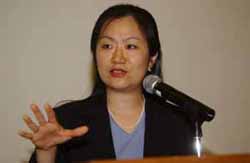Junn Probes Link Between Education and Democracy in Sussman Lecture
Sussman Visiting Professor Jane Junn advanced a contrarian view in this year's Sussman Lecture. Titling her remarks, "What Good Is Education for Democracy?" she invited the audience to suspend their disbelief and consider the possibility "that education might not always be the best thing for democracy."
Junn, who is Associate Professor of Political Science at Rutgers University, has written extensively on political participation and election in the United States, with a special emphasis on the role of education in promoting democratic citizenship, political behavior and attitudes among American minorities and immigrants. Her book, Education and Democratic Citizenship in America, written with Norman Nie and Ken Stehlik-Barry, was named the best political science book of 1997 by the American Political Science Association.
"There has long been a widely held belief in the critical role of education in the maintenance of a healthy democracy," Junn said. "Philosophers as diverse as Aristotle, Locke, Mill, Jefferson, Mann and Dr. King have all spoken of the enduring role of education in the development of democratic citizens." That role is largely one of inculcation, she said. "Education trains people to think about the norms and goals of democracy, and to adhere to principles and basic values of democratic thought."
According to the conventional wisdom, education's importance to democracy derives from two basic functions. "First, education is a socializing mechanism," Junn said. "It imparts values, teaches us how we ought to behave and what we need to know about politics, tolerance and principles like quality and fairness." Second, education serves as a sorting mechanism, "conferring skills and signaling a placement for each individual in the political and social hierarchy."
While such ideas are not new, "the juxtaposition of these two functions raises interesting issues when we consider the circumstances under which education may work against equality and democracy." Citing studies in sociology and labor economics, she characterized education as "one of the most powerful stratifiers in post-industrial society." The same data that validate the critical importance of education to social, political and economic outcomes and inform the position that more education is better "also identify education as the main mechanism perpetuating inequality and hierarchy."
Education has never been more widely available than at present, Junn noted; indeed, the percentage of the general population to have graduated from high school has doubled in the last 40 years. "It would follow that people would thus be more knowledgeable, active, and participatory in democratic processes," she said. "But that's not the case. There have actually been dramatic decreases in social and political involvement."
Some political scientists view this as a problem, others as a paradox, still others as both a problem and paradox. "But what is certain is that education is a force that is at once both a positive sum and a zero sum," Junn said. "It imparts skills to those who take part, but it also acts as a powerful sorting device, placing some at the top of the hierarchy and leaving others at the bottom."
As a driver of social stratification, "education can be conceived as exactly the opposite of an equalizing force," she said. The irony is that education is commonly viewed as a purveyor of equal opportunity. "But in reality, at the macro-societal level, education may reproduce and legitimate structural inequalities that drive disparities in wealth and nurture the dominance of in-groups to the systematic disadvantage of out-groups."
Notwithstanding the title of her lecture, it may be more productive to ask what good democracy is for education, Junn suggested. "To properly address the problems of democracy, we must train the focus of our policy recommendations not only on the education community at large, but on the structures and institutions of government itself," she said. "We must ask whether citizens are being presented with adequate resources to act, and how we might reenvision the incentives for political engagement to be more inclusive of all citizens."
Junn recalled John Dewey's observation that one of the most important roles of education is to promote the social continuity of life. "If one of these continuities in a democracy is based on principles of liberty and equality, and in that regard innovation, it should be the case that we should continually strive to improve our democratic system of institutions and structures."
Ultimately, more education and more democracy do hold promise for a better America, Junn said. "But it must be a democracy that is enacted in a way that provides equal access and opportunities to participate." Education can make democracy possible, she said, "but it must also be the case that democracy enables education to find its transformative potential."
Published Tuesday, Sep. 9, 2003
